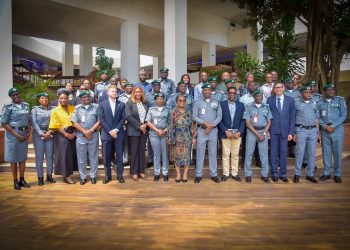By Nkechi Eze
Nigeria’s fight against terrorism is set to enter a new phase as the National Counter Terrorism Centre (NCTC) moves closer to unveiling the revised National Counter Terrorism Strategy (NACTEST), following the Third Quarter Stakeholders’ Meeting held on Tuesday, 26 August 2025, in Abuja. The gathering brought together senior government officials, security agencies, civil society organisations, academia, international partners, and community representatives, underscoring the “whole-of-government” and “whole-of-society” approach that has guided the review of the strategy since it was initiated in February 2025.
Welcoming participants, the National Coordinator of the NCTC, speaking on behalf of the National Security Adviser, Mallam Nuhu Ribadu, said the review process was born out of the need to align Nigeria’s counterterrorism framework with the rapidly evolving security landscape. He explained that the threats facing the country today are more complex, adaptive, and technologically driven than those envisaged when the original NACTEST was first launched in 2016.
“Terrorist groups have continued to shift tactics, exploit new technologies, and take advantage of vulnerabilities across our social and economic systems. It became clear that the Strategy needed to be revised to remain effective, comprehensive, and future-facing,” he said.
The National Coordinator revealed that after months of consultations, workshops, technical reviews, and validation exercises involving stakeholders across multiple sectors, the revised draft has been finalised and submitted to the National Security Adviser for approval. Once approved, it will undergo professional editing and printing before being officially launched by President Bola Ahmed Tinubu, GCFR.
While applauding stakeholders for their contributions so far, the National Coordinator stressed that the ultimate success of the strategy would depend on its implementation. “The true measure of success lies in its faithful implementation, and we all have a role to play as defined in the Strategy. The Strategy can only succeed if we collectively own it and translate its provisions into practical, coordinated actions across the five work streams; Prevent, Protect, Identify, Prepare, and Implement,” he stated.
The Director of Policy and Strategy at the Centre, Commodore Ahmed Madawaki while addressing the session, highlighted the progress made and the inclusiveness of the review process. He recalled that apart from domestic consultations, international partners such as the EU-UN Global Terrorism Threat Facility and UN Women provided expert non-binding assessments on the draft. According to him, the wide-ranging consultations, coupled with a validation exercise earlier in the year, have ensured that the revised document is robust, threat-responsive, and consistent with international best practices.
He emphasised that the current phase of engagement is crucial for ratifying the roles and responsibilities of focal point officers across Ministries, Departments and Agencies (MDAs), civil society organisations, private sector actors, and grassroots stakeholders. “Our goal is to ensure that all MDAs understand their roles and responsibilities, and carry out related programmes after the launch of the revised strategy. Furthermore, the Centre aims to achieve a good understanding of the strategy among civil society organisations, the private sector, academia, and traditional and religious leaders,” he said.
The meeting also reflected on the broader significance of Nigeria’s counterterrorism efforts. With the NCTC consolidating its position as a Regional Centre of Excellence for Counterterrorism in West Africa and the Sahel, the revised NACTEST is expected to not only secure Nigeria but also serve as a model for neighbouring countries confronting similar threats. The National Coordinator underscored that Nigeria is increasingly looked upon for leadership, coordination, and innovation in counterterrorism and countering violent extremism.
Looking ahead, the Director of Policy and Strategy also hinted that once the official launch of the revised NACTEST happens in October, it is expected that stakeholders would reconvene to work on the implementation plan, which will guide Nigeria’s counterterrorism operations in the coming years.
The meeting closed on a note of unity and shared responsibility, with the NCTC reaffirming its commitment to provide leadership, coordination, and technical guidance. Both speakers expressed optimism that the revised strategy will not only strengthen Nigeria’s domestic security framework but also enhance regional and global cooperation in tackling terrorism.
















